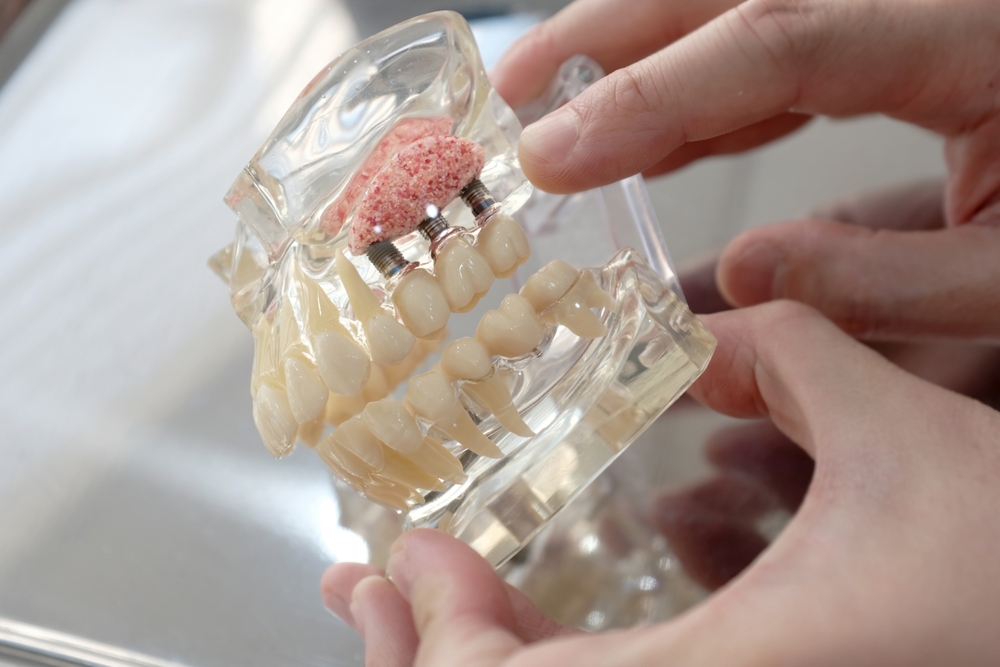
Understanding Dental Implants
Dental implants provide a modern and effective replacement for missing teeth. These titanium posts act as real tooth roots and are implanted into the jawbone to secure prosthetic teeth. They not only look natural but function like your own teeth and can last a long time when properly placed. Whether replacing one tooth or several, dental implants significantly enhance oral health and restore confidence. Let’s explore this essential dental option in detail.
What Are Dental Implants?
Dental implants efficiently replace missing teeth, featuring an artificial tooth root typically made of titanium, which integrates well with human tissue. This integration, known as osseointegration, stabilizes the implant by anchoring it to the jawbone, creating a strong base for crowns or bridges. Dental implants function like natural teeth, enhancing your smile and oral health. Unlike dentures, they offer a long-term solution that allows you to chew, talk, and smile comfortably.
Who Is a Good Candidate for Dental Implants?
Dental implants effectively replace missing teeth, particularly for individuals with good oral health and sufficient jawbone density. Even individuals with some bone loss due to aging or gum disease may be eligible for consideration after undergoing a bone graft. Maintaining healthy habits is crucial, as poor oral hygiene or gum disease can reduce the success of implants. However, not everyone is a suitable candidate; severe periodontal disease or significant health issues may disqualify some individuals. Consult your dentist or oral surgeon to determine if dental implants are right for you. Advances in technology have expanded eligibility for this treatment.
The Dental Implant Process Step-by-Step
The dental implant procedure is a detailed journey, beginning with a consultation where your dentist assesses your oral health and creates a personalized treatment plan. Next, during the implant placement, the dentist inserts the implant into your jawbone to serve as a replacement for the natural tooth root. This phase includes multiple stages and healing periods to ensure durability and longevity.
Initial Consultation and Evaluation
The journey begins with a consultation, during which your dentist evaluates your oral health to determine dental implant suitability. They may use X-rays to assess the quality and quantity of your jawbone, checking for issues such as periodontal disease or gum infections that need to be treated first. Your dentist will also review your medical history and habits, such as smoking, to create a personalized treatment plan. This is the time to ask questions and address any concerns you may have. Choosing a trusted dental provider or school ensures optimal care and support, helping restore both your oral health and smile.
Placement of the Dental Implant
Placing dental implants is a precise surgical procedure. The oral surgeon begins by preparing the gums and then makes a small incision to access the jawbone. Using specialized tools, the surgeon creates space for the titanium implant, which acts as an artificial tooth root, ensuring proper placement and stability. After securing the implant, the gums are stitched to promote healing. Depending on your needs, a temporary tooth may be available during recovery. Successful healing after surgery is crucial for the long-term success of your implant.
Healing and Osseointegration
The healing process after implant placement is crucial for long-term success. Once the implant is placed in the jawbone, osseointegration begins, allowing the jawbone to naturally bond with the titanium implant, ensuring strength and durability. Healing can take anywhere from three to nine months, depending on the individual and their adherence to care instructions. During this period, surrounding soft tissue also strengthens. Maintaining good oral hygiene—brushing, flossing, and avoiding tobacco—is essential to prevent complications. Once healed, your dentist will complete the final steps of your implant treatment.
Attaching the Abutment and Crown
After healing, the next step is placing the abutment and crown—the final touches for your prosthetic. The abutment connects the implant to the prosthesis, ensuring stability. The custom crown mimics the appearance and function of natural teeth. Placing the abutment involves a simple procedure to secure the connector properly.
Component Description:
- Abutment: A small connector atop the implant that holds the prosthetic tooth.
- Crowns/Prosthesis: Custom-made fake teeth designed to fit your smile and support oral health.
- Single Tooth Implant: A solution for missing teeth that enhances both aesthetics and functionality.
With your new crown, your smile is restored in both form and function.
Benefits of Dental Implants for Your Smile
Dental implants offer numerous benefits to individuals who have experienced tooth loss. They give a strong foundation that helps you chew, speak, and smile with confidence.
Dental implants differ from traditional dentures or bridges. They keep the bone structure in your jaw healthy and blend well with your natural teeth. This dental restoration improves your quality of life. Many people pick implants because they want a long-lasting solution.
Discover how these changes can enhance your daily life, both in terms of how you feel and what you can accomplish.
Functional and Aesthetic Improvements
Dental implants offer significant benefits for both how your teeth work and how they look. They are made to be as close as possible to your natural teeth. You get what you want from them because they look, feel, and work much more like your own teeth. This helps you avoid the problems that come with regular dentures.
- Improved chewing: Eat your food with comfort and freedom.
- Speech restoration: Talk with ease and sound natural. There is no need to worry about implants moving.
- Enhanced appearance: You will have a great, custom smile that can boost your confidence and make you feel good about yourself.
- Durability: Implants are extremely strong and durable, providing you with lasting peace of mind.
With their careful design and use of modern materials, dental implants restore your ability to eat and speak normally. They also help you get a good-looking smile again.
Long-Term Oral Health Advantages
Beyond just looking good immediately, getting implants benefits your oral health in the long run. They stop bone loss in your jaw, which can be a problem after tooth loss. Unlike bridges, dental implants do not need you to change the teeth next to them, so your other teeth stay the way they are.
When you floss and attend regular dental visits, you protect your implants and maintain healthy gums. With dental implants, you are much less likely to have other complications in your mouth over time.
Investing in dental implants is a smart way to prioritize your oral health and enjoy lasting improvements. Dental implants are strong and not only help fix tooth loss—they also protect you from other dental problems that could show up later.
Schedule a Consultation
The team at Holmes Dental is dedicated to providing you with the best possible version of your smile. Schedule a consultation today to get started.

 Dan Holmes, DDS
Dan Holmes, DDS Nicole Holmes, DDS
Nicole Holmes, DDS Our Team
Our Team




